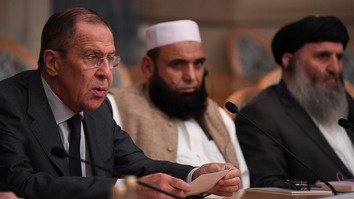KABUL -- A meeting in Moscow between Afghan opposition politicians and representatives of the Taliban earlier this month shows the Taliban's allegiance to Russia, analysts say.
The February 5-6 "peace talks" excluded the Afghan government and were likely engineered by the Russian government, not by Afghans living in Russia as stated by the Kremlin.
"So far, Russia has held two meetings ... aimed at fulfilling its interests in the region, especially in Afghanistan, and to harm the interests of the United States, the Afghan government and the negotiation process," Aminullah Shariq, a political analyst and former governor of Paktika Province, told Salaam Times.
"I believe that Russia's intelligence service was the architect of the Moscow meeting," he said.
![Afghans February 6 in front of the Russian embassy in Kabul protest the Moscow meeting. [Mahdi Mubasher]](/cnmi_st/images/2019/02/20/16776-51474-585_329.jpg)
Afghans February 6 in front of the Russian embassy in Kabul protest the Moscow meeting. [Mahdi Mubasher]
The Russian embassy in Kabul and the Russian Foreign Ministry issued statements claiming that Afghans residing in Russia organised the meeting, but those were "an attempt to hide the truth and to say that the Russians do not interfere in Afghanistan's internal affairs", Shariq said.
"Moscow is seeking partners and allies in Afghanistan and wants to bring to power in Afghanistan certain groups whose political agenda is close to Russia's," he said.
"Afghans must understand that those who fight in the name of religion are nothing but big liars," he said, referring to the Taliban.
The Taliban rejected planned talks in Jeddah and Makkah, in the direction of which all Muslims pray, "yet they attended the Moscow summit with much enthusiasm, working in line with the Russian intelligence", Shariq said.
Allegiance to Russian intelligence
The Taliban demonstrated their obedience to Russian intelligence by participating in the meeting, said Kabul-based political analyst Nabi Mesdaq.
"The Moscow meeting -- in which a number of political parties and influential individuals gathered with Taliban representatives -- was a political move by Russia, which was made for its own benefit," he told Salaam Times.
"The closing resolution was entirely in the interests of the Russians and of the Taliban and at the expense of our government and our people," he said.
Religious scholars and other Afghan citizens quickly admonished the participants of the Moscow meeting and pointed out the illegitimacy of any promises made without the input of the Afghan government.
"Once the Russian embassy in Kabul realised the negative reaction to, backlash to, and sharp criticisms of the aforementioned summit, it immediately hid the truth ... by announcing that the meeting was hosted by the Afghan diaspora in Russia," Mesdaq said.
"The Taliban's refusal to participate in peace meetings held by religious scholars [in Indonesia and Saudi Arabia], as well as their participation in the Moscow summit, clearly shows the group's affiliation with Russian intelligence," he said.
Undermining Afghanistan
Civil society activists held a demonstration in Kabul on February 6, calling the Moscow meeting unacceptable to the Afghan public.
"As civil society activists, we call on Russia not to meddle in Afghanistan's internal affairs," Mahdi Mubasher, one of the protesters, told Salaam Times.
"If Moscow is truly trying to establish peace and stability in our country, then it should co-operate with the government and people of Afghanistan," he said.
"Those who participated in the Moscow meeting were not representing the Afghan people," he said.
"Moreover, this meeting was unacceptable to us since representatives of civil society, youth, women, media, government and religious scholars did not participate," he said.
"We held a protest in front of the Russian embassy, so that [Russia] stops interfering in our internal affairs, and [to declare] that the Afghan public will never accept a Taliban government in power," Mubasher said.
Seeking to prolong war
"By holding this meeting on Afghanistan's peace without inviting the Afghan government, the Russians gave political legitimacy to the Taliban," Sayed Safiullah Hashemi, a representative of Samangan Province in the Meshrano Jirga (upper house of parliament), told Salaam Times.
"Moreover, by gathering a number of Afghans at the same table with the Taliban, [Russia] not only questioned the legitimacy of the Afghan government but acted against the national interests of [Afghanistan] in order to undermine the government," he said.
"The Taliban did not attend the Islamic world scholars' meeting held in Indonesia and Saudi Arabia," he said. "It does not negotiate with the government that represents the nation."
"Yet, it positively responds to and participates in the Moscow conference based on an invitation from Russia -- a country that in my opinion does not want to bring peace and tries only to compete with the United States and to interfere in Afghan affairs," Hashemi said.
"This does not mean securing peace in our country; rather, it shows that Russia and the Taliban both want to prolong the war," he said.

![Participants attend the opening of two-day talks between the Taliban and Afghan opposition representatives in Moscow February 5. [Yuri Kadobnov/AFP]](/cnmi_st/images/2019/02/20/16777-000_1d23yj-585_329.jpg)






